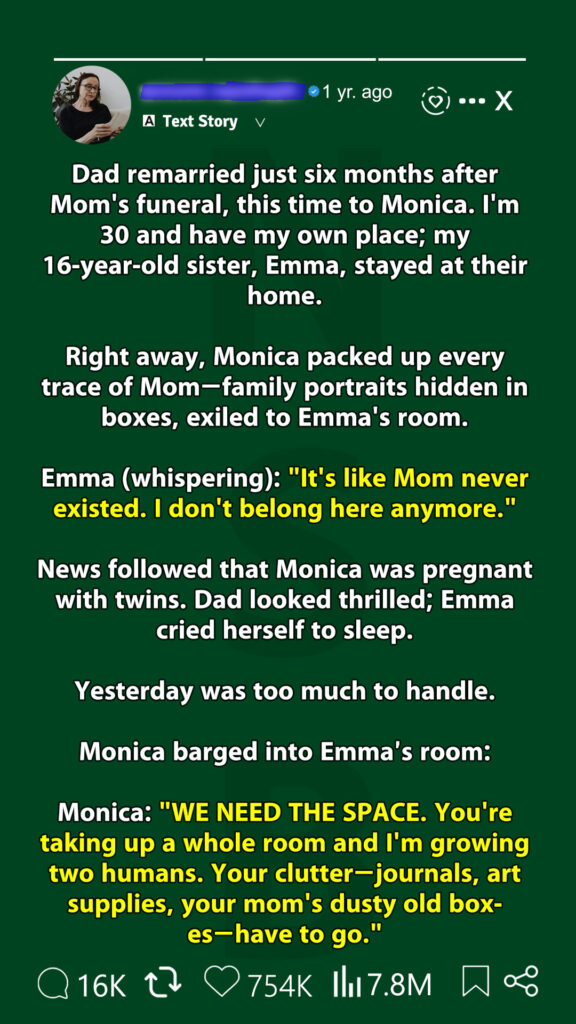Grief doesn’t just leave a hole—it invites others to fill it. After our mom died, my little sister Emma and I clung to the memories stitched into the walls of our childhood home. But when Dad remarried, that home became a battleground. And Emma, just sixteen, was the first casualty.
I’m Britt. Thirty, pragmatic, protective, and fiercely loyal to the girl who still calls me “B” when she’s scared. Emma and I grew up in a house that smelled like lavender and burnt toast. Our mom was the kind of woman who made space for everyone—who sang Sade while folding laundry and drank her coffee black because “life’s too short for sugarcoating.” When she passed, the silence was unbearable. But we held onto the little things. Her chipped mug. Her quilt. Her laugh, echoing in memory.

Then Dad met Monica.
She was polished, poised, and emotionally tone-deaf. Within weeks of moving in, she erased Mom from the house like she was editing a photo. Family portraits disappeared. The quilt vanished. Even Mom’s name was spoken less and less. Monica called it “fresh energy.” I called it erasure.
Emma bore the brunt of it. Her room became the dumping ground for everything Monica didn’t want to see—boxes of memories, framed photos, even Mom’s old books. Monica treated Emma like clutter. “You take up too much space,” she said one day, arms folded, eyes cold. “This house needs breathing room.”
Then she did the unthinkable.
She told Emma to leave.
No discussion. No warning. Just a cruel eviction masked as “tough love.” Dad didn’t stop her. He’d become a shadow of himself, nodding along to Monica’s decisions like a man who’d forgotten how to fight for his children.
Emma called me, voice shaking. “She said I don’t belong here anymore.”
I didn’t hesitate.
What Monica didn’t know was that Mom had left the house to Emma in her will. Quietly. Intentionally. A final act of protection. I’d kept the paperwork safe, waiting for the day it might matter. That day had come.
I drove straight to the house, documents in hand. Monica tried to play innocent, claiming Emma was “unstable” and “dramatic.” I didn’t argue. I handed her the will. Her face drained of color.
“This house,” I said, “belongs to Emma. Legally. Emotionally. Entirely.”
She sputtered. Dad looked stunned. But the truth was undeniable.
I gave Monica two weeks to vacate. Emma didn’t gloat. She cried. Not because she wanted revenge—but because she’d finally been seen. Validated. Protected.
Now, Emma lives in that house. She’s repainting the walls, one room at a time. The quilt is back on the couch. Mom’s mug sits by the sink. The silence feels softer now—less like absence, more like peace.
As for Monica? She learned that space isn’t something you take. It’s something you earn. And Emma? She’s no longer afraid to take up space. She owns it.


